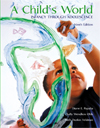 |  A Child's World: Infancy through Adolescence, 9/e Diane E. Papalia,
University of Wisconsin-Madison
Sally Wendkos Olds
Ruth Duskin Feldman
Psychosocial Development in Early Childhood
Chapter Overview
Chapter 11 traces several strands of psychosocial development in early childhood.
In this chapter, the authors: Trace the development of young children's sense of self, understanding of emotions,
and self-esteem
Present Erikson's "crisis" of early childhood, initiative versus guilt.
Discuss how children develop gender identity, and explore theories and research
on how gender differences come about
Describe types of play, and examine how culture influences play
Assess the influence of child-rearing styles and practices
Explain how altruism (prosocial behavior), aggression, and fearfulness develop,
and how they are influenced by parental treatment
Describe relationships with siblings and peers, characteristics of the only
child, and how family relationships and peer relationships influence each other |
|



 2002 McGraw-Hill Higher Education
2002 McGraw-Hill Higher Education